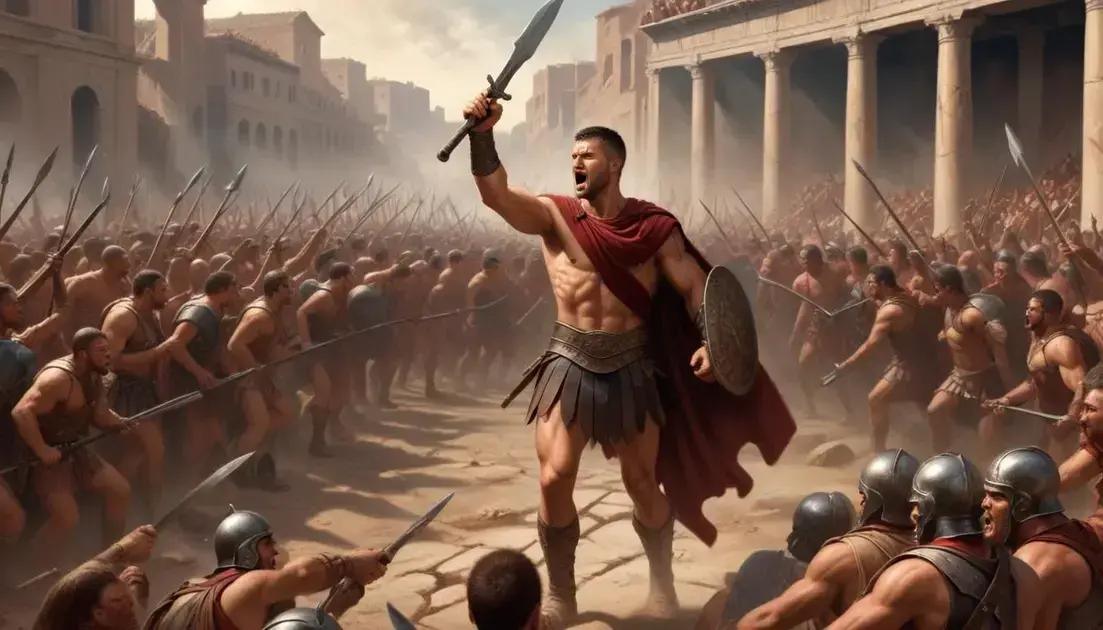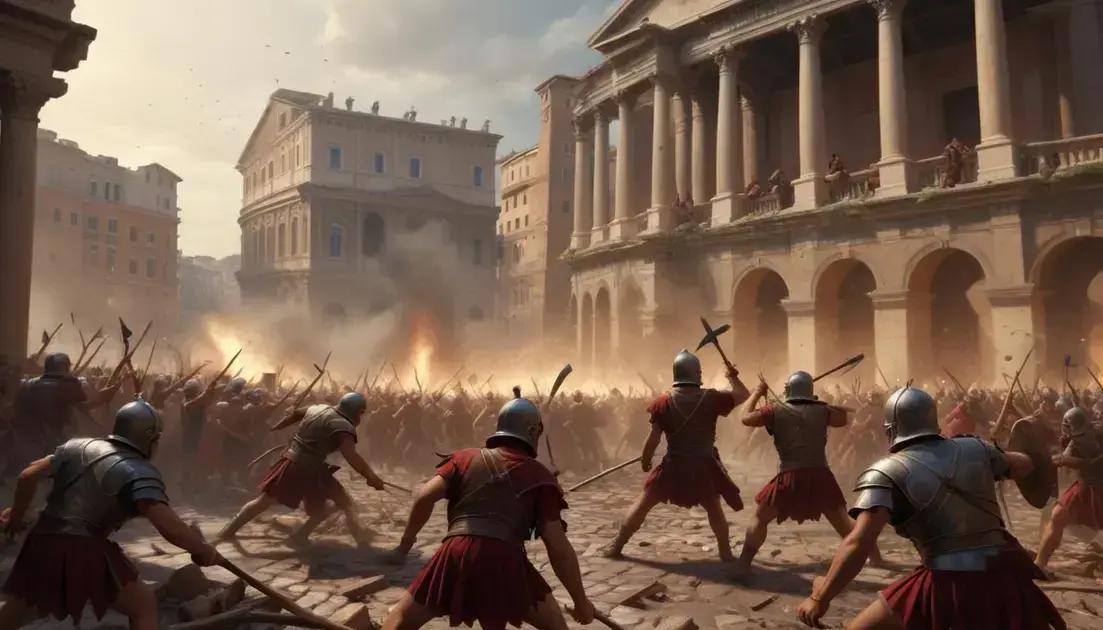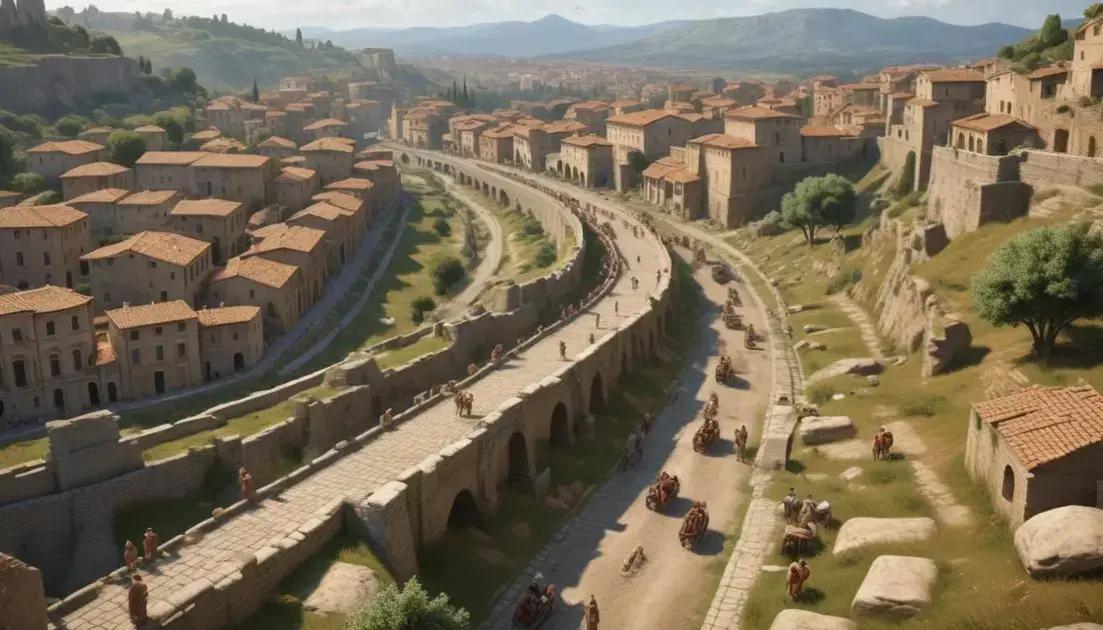
Spartacus’ Revolt: Slavery and Rebellion in the Heart of Rome
Spartacus’ revolt was a significant uprising against Roman slavery that highlighted the struggle for freedom and justice. His fight inspired many, showcasing the power of unity in the quest for emancipation. The rebellion raised awareness about the moral issues surrounding slavery and emphasized the importance of perseverance in the face of oppression. Today, Spartacus’ legacy continues to resonate, reminding us of the ongoing fight for human rights and the value of standing up against injustice.
Spartacus ignited a flame of rebellion in the heart of Rome, challenging the oppressive system of slavery. But what drove him and his followers to fight for their freedom?
Introduction to Spartacus
Spartacus was a gladiator who became famous for leading a major slave revolt against the Roman Republic. His story is about freedom, bravery, and the fight against oppression. Spartacus was born in Thrace, and he fought as a soldier before being captured and sold into slavery.
In the gladiator school, he trained hard and became skilled in combat. His desire for freedom burned inside him. When he escaped, he didn’t just run away. He took other slaves with him. They united against the Roman army, aiming to break the chains of slavery.
Spartacus believed in a world where everyone could be free. His army grew as he inspired others to join. They traveled across Italy, winning battles and gaining strength. The rebellion showed the power of unity and hope, showing that even the oppressed could stand tall.
The revolt was not just a fight for their lives but a fight for a cause. Spartacus wanted more than just freedom; he wanted justice for all enslaved people. His legacy still inspires many today.
The Background of Slavery in Rome
Slavery in Rome was a complex system that affected many lives. People became slaves for various reasons. Some were prisoners of war, while others were born into slavery. Debt could also lead to enslavement.
In Ancient Rome, slaves were a key part of society and the economy. They worked in homes, farms, and mines, often enduring harsh conditions. Many slaves were skilled workers, educated, or even managed large estates.
Being a slave meant having no freedom. Slaves had no rights and could be treated poorly. However, some could earn their freedom through loyalty or buying it back. This was a rare chance, but it did happen.
Roman attitudes towards slavery were mixed. While some viewed it as normal, others began to question the morality of it. Key thinkers and philosophers discussed the ethics of slavery. Over time, movements started to seek better treatment for slaves.
Understanding the background of slavery in Rome is important. It sheds light on the struggles and fights for freedom that followed. Spartacus’s revolt was fueled by these very injustices.
The Impact of Spartacus’ Revolt
The impact of Spartacus’ revolt was significant, shaking the foundations of Roman society. This uprising, which began in 73 BC, involved thousands of enslaved people fighting for their freedom. They challenged not only their captors but also the very system that upheld slavery.
Spartacus showed that the desire for freedom could unite many. His revolt inspired hope among other enslaved people and struck fear in the hearts of the Roman elite. They saw how quickly the situation could change when the oppressed fought back.
The revolt wasn’t just about physical battles. It raised big questions about slavery and humanity. People started talking about the rights of slaves and the morality of their treatment. Thinkers and activists began to speak out against the cruelty of slavery.
Despite its eventual defeat, Spartacus’ revolt left a lasting mark. It reminded future generations of the struggle for freedom. This uprising fueled other movements that sought to end slavery not only in Rome but in later societies as well.
The revolt also changed military strategies. Roman leaders learned to adapt their forces and strengthen defenses. They understood that they couldn’t take loyalty for granted, leading to changes in how they treated their slaves.
Lessons from the Rebellion
There are many lessons from Spartacus’ rebellion that still resonate today. One key lesson is the power of unity. Spartacus united thousands of enslaved people, showing that together they could challenge their oppressors.
Another lesson is the importance of fighting for freedom. Spartacus fought not just for his own freedom but for the freedom of all enslaved people. His courage inspired others to seek justice and change.
The rebellion also highlights the need for awareness. It urged people to understand the struggles of others. Awareness can spark change and lead to movements that fight against injustice.
Additionally, Spartacus’ story teaches us about resilience. Despite facing overwhelming odds, he continued to lead and motivate his followers. His determination reminds us that perseverance, even in the hardest times, can lead to significant change.
Finally, the rebellion reflects how history can shape future actions. Spartacus’ fight has inspired numerous movements for freedom and human rights throughout history. Learning from these lessons helps us remember the importance of standing up for what is right.
Concluding Thoughts on Freedom
Freedom is a powerful idea that can inspire action and change. It means more than just being free from physical restraint. True freedom includes the ability to make choices and live without fear. Spartacus fought for this kind of freedom.
Throughout history, many have sought freedom, inspired by leaders like Spartacus. His story shows us the importance of standing up against oppression. Fighting for freedom can create a ripple effect, encouraging others to join the cause.
The journey towards freedom is often hard. Many face obstacles and challenges along the way. Yet, history teaches us that perseverance is key. Like Spartacus, those who strive for freedom often become symbols of hope.
Today, the struggle for freedom continues. Many people fight for their rights and the rights of others. Learning from the past helps us understand these fights better. It reminds us that every action counts.
In the end, freedom should be a shared value. It’s about creating a world where everyone can thrive without fear. The lessons from Spartacus and his rebellion remain relevant as we work towards a more just society.
Conclusion
In conclusion, the story of Spartacus and his fight for freedom teaches us valuable lessons. It reminds us that unity and courage can lead to great change. Spartacus not only battled for his freedom but also for the freedom of many others. His actions inspired future generations to stand up against oppression.
Freedom is more than just the absence of chains. It’s about having the right to make choices and live without fear. As we reflect on the past, we see how important it is to continue the fight for justice and equality today.
Let’s remember that every effort counts in the struggle for freedom. Whether big or small, our actions can inspire others. By standing together, we can create a world where everyone enjoys the freedom they deserve. The journey may be challenging, but together, we can achieve lasting change.


